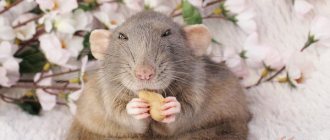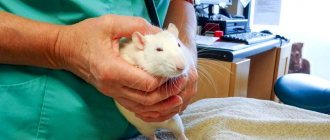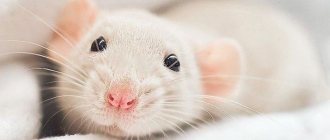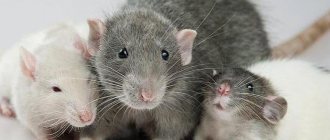People use a variety of methods to control rats and mice. Many choose a radical path - they destroy rodents with pesticides or place traps around the house. But there are those who hope to solve the problem safely and humanely - by scaring away unwanted neighbors.
Having chosen this option, it is worth figuring out what will really help repel rodents, and what means will be useless against rats and mice.
Smells to repel rodents
As you know, rodents have a well-developed sense of smell. For example, after the first inhalation, a rat accurately determines in which direction the source of a particular odor is located, and by sniffing the mark of another rodent, it receives information about its gender, age, and social status.
With the help of a subtle sense of smell, rodents navigate the surrounding space, find food, communicate with relatives, and learn about danger. Naturally, among the huge variety of odors, there are those that animals cannot tolerate. It is them that people use to protect their territory from rodents.
Dinner
The problem is that many of the scents that repel rats and mice are also unpleasant to humans. And the use of some products (especially in residential premises) is simply impossible. For example, knowing what smell mice dislike most will not help in any way to get rid of them in the house, because the most terrible smell for them is the excrement of their natural enemies (rats, snakes and cats).
It is unlikely that anyone is ready to spread animal feces around the house, even if the purpose of such an event is to get rid of rodents. Therefore, to scare away, you should still choose something that rats and mice are afraid of, but a person perceives normally.
Who are pests afraid of?
Not all rodents are afraid of cats. The exception in this case is large pasyuki or gray rats. Many of them are able to move freely in broad daylight, without paying much attention to the mustachioed pet sitting next to them. However, there are also brave cats who are not afraid to attack uninvited guests. The dog easily attacks a large rat.
Rats versus mice are also a common occurrence in nature. Where large rodents have settled, small ones will never appear. After all, a hungry rat poses a serious danger to a little mouse. Rodents are also afraid of people, but in some cases rats can attack humans.
Essential oils against rats and mice
Aromatherapy enthusiasts suggest fighting rodents with the help of essential oils. In the process of numerous studies, as well as experimentally, it was revealed which smell repels mice and rats. This is the aroma that peppermint produces. It forces rodents to leave even their comfortable homes. You can also use oils:
- eucalyptus;
- tea tree;
- wormwood.
Despite the fact that rats are afraid of these odors, they gradually get used to them, so no matter which one was chosen for repelling, after some time it must be replaced with another. Essential oils can be poured into aroma lamps, added to water and sprayed into rooms, dripped onto napkins or cotton pads, which are then placed in corners and behind furniture.
Chemicals against rodents
When talking about what odors repel rats and mice, do not forget about household chemicals and some flammable materials. Mice and rats are afraid of:
- bleach and chlorine-containing products;
- turpentine;
- kerosene;
- gasoline.
Petrol
But using these means to repel rats is inconvenient and sometimes dangerous for people and pets. After all, they will also have to breathe in caustic fumes, and in the case of kerosene, gasoline and turpentine, the possibility of an accidental fire cannot be ruled out.
How to get rid of rats and mice using herbs?
Our ancestors also used various herbs in the fight against rodents. If you list the smell of which plants rats don’t like, then you should start with elderberry. In order to drive rodents out of the area, it is enough to plant several bushes, and plant branches placed in the corners will help keep mice and rats out of the house.
Whichever herb you add from the following will certainly have an effect, since both rats and mice are afraid of:
- sagebrush;
- wild rosemary;
- peppermint;
- tansy;
- black root medicinal.
Herbs are effective as long as they produce an aroma. Just as in the case of essential oils, plants must be alternated periodically so that rodents do not have time to get used to the smell.
Attention! Even though these products are natural, they can also harm people. Thus, elderberry and wild rosemary are not recommended for use in residential premises, especially if there are small children and pets in them.
Is ultrasound effective?
Specialized stores offer ultrasonic devices that, according to manufacturers, repel rodents. Indeed, rats and mice perceive ultrasound, and certain frequencies cause anxiety and even panic in them. This option is considered by many to be the most acceptable, but to ensure results, several factors must be taken into account:
- purchase high-quality and powerful devices, avoid useless counterfeits;
- the device must distribute sound evenly in all directions;
- It is desirable that the ultrasound frequency changes automatically, so it will be more difficult for rodents to get used to it.
You should also remember the disadvantages.
- Firstly, despite the fact that people do not hear high-frequency sounds, prolonged exposure to radiation can cause deterioration of health and headaches for some.
- Secondly, ultrasound is heard by hamsters, dogs and cats, so the device can both scare away rats and cause discomfort to pets.
Plague bacteria in cats
Some rodents carry plague, an infection caused by the bacteria Yersinia pestis. 4 These are essentially the same bacteria that caused the infamous “Black Plague” of the Middle Ages. Plague is often spread by fleas, but cats can become infected by eating the meat of infected animals (often small mammals).
Cats infected with Yersinia pestis may experience lethargy, depression, loss of appetite, vomiting, diarrhea, cough, muscle soreness, and fever. The cat may develop swollen lymph nodes, lesions in the mouth, and weight loss.
Treatment includes the use of antibiotics and supportive care. The sooner treatment can be started, the higher the chances of survival.
People rarely become infected with the plague. When they do become infected, it is usually through a flea bite. Symptoms and treatment are relatively similar to those in cats.
Folk remedies
For hundreds of years, people have noticed what rats and mice are afraid of; based on these observations, an impressive list of folk remedies has emerged that help get rid of rodents. Most popular recipes:
- the smell of burnt rubber;
- spices (cloves, hot chili pepper, coriander, sage);
- naphthalene;
- garlic;
- the smell of burnt fur;
- tobacco.
Tobacco
But as practice shows, it is not always possible to scare away rats using folk remedies. Each case is individual. For example, one housewife's rodents will be frightened by the smell of garlic, while another will eat some of the cloves and put the rest in a neat pile. And mustachioed pests get used to the aroma of spices quite quickly.
Using the contents of the kitchen cabinet
If you don’t have a cat and don’t want to spend money on purchasing plant extracts, ordinary spices available in the arsenal of any housewife will help. The smell will help save supplies from the invasion of gray guests:
- carnations;
- coriander or cilantro;
- red pepper;
- sage;
It is allowed to use powder or seeds of these seasonings. Dry sage leaves, which are best burned, are also suitable. The strong aroma of coffee will also help repel rodents; freshly roasted beans work best.
Also, pests do not like the scent of vinegar, which can be poured into small containers and placed around the room. Although this option is more suitable for protecting cottages from rodents in the winter, since constantly inhaling a pungent odor is not only unpleasant, but also unsafe. The aroma of bleach scattered in the corners is also suitable for the same purpose.
Others
In addition to smells, you can try to repel rats and mice with other methods. To do this, you need to know what rodents are really afraid of, and what causes them minor inconvenience and can only make them move away for a while, but not leave their homes.
Light
In a normal situation, rats are active mainly in the dark. This is due to the fact that animals see better in the dark, and in addition, at night the risk of meeting their main enemy - humans - is much less. However, to the question of whether rats are afraid of light, the answer is likely to be negative.
Rodents very quickly get used to constant lighting. There is plenty of evidence of rats hunting or searching for food during the day. Therefore, it is possible that the animals will behave more cautiously at first, but the bright light will definitely not make them leave.
Loud sounds
As for sounds, the situation is similar to scaring with bright light. Rats are really afraid of noise, but only until it becomes familiar to them. After this, they will perceive it as an unpleasant background that will not interfere with leading a normal lifestyle, and then they will stop perceiving it altogether.
Moreover, scaring away rodents with loud sounds is very inconvenient for owners. Constant noise will cause discomfort, displease neighbors, and besides, it will still have to be turned off at night.
Water
Mice don’t really like water, but rats feel comfortable in it, in nature they settle along the banks of reservoirs, swim well and even fish. But even about mice it cannot be said for sure that they are so afraid of water that they will leave the room because of its presence. Yes, and then it is very difficult to imagine how water can be used to repel rodents. It is unlikely that any of the owners will flood the floors in the house with water or deliberately dig a pond on the property.
Cat
Cats are natural enemies of rodents. Therefore, most often, rats and mice try to stay away from places where they clearly sense traces of the vital activity of mustachioed pets. But there are nuances here too.
If we are talking about a pampered pet who has never hunted and does not show any desire to start doing it, then the rodents will gradually get used to his presence. Over time, they will begin to behave more and more impudently, carry cat food, and may even scare a particularly impressionable cat.
Hunter
blackroot plant
The common name for all types of blackroot goes back to Ancient Greece. Because of its elongated, rough leaves, the ancient Greeks called blackroot “dog’s tongue.” Later, the Romans adopted the tradition, so in modern reference books the plant has the Latin spelling “Cynoglossum”.
Types of blackroot
Today, scientists count more than eighty species of blackroot, most of which grow in the tropics and subtropics. Less than ten species are found in our latitudes. But they are widespread everywhere.
All types of blackroot are distinguished by a soft covering of green parts in the form of small short fibers. The root of the plant grows deep into the ground and has a spindle-shaped shape. Blackroot blooms in paniculate inflorescences, and the ripening fruits are nuts with curved spines.
In ancient times, mystical properties were attributed to black root decoction. They sprinkled it on the walls of houses and pens for domestic animals. It was believed that the smell of the broth drove away not only mice, but also evil spirits.
The effectiveness of the repellent method
The scaring method has both adherents and opponents. The first believe that the use of natural remedies and improvised materials is a fairly effective method of controlling rodents in the house. The latter argue that rats are smart animals that can quickly adapt to any conditions, so the likelihood that you can scare them away with grass or vinegar is very low.
Every opinion has the right to exist. There are a lot of methods of repelling rodents, each of which has its own character, life experience, habits, and degree of susceptibility. There is only one way to check how effective a particular method is - try to put it into practice and evaluate the result. The main thing is to act wisely, without going too far. Otherwise, it may happen that the house smells of essential oils or vinegar, the residents will suffer from headaches, and the rats will run around as if nothing had happened.










